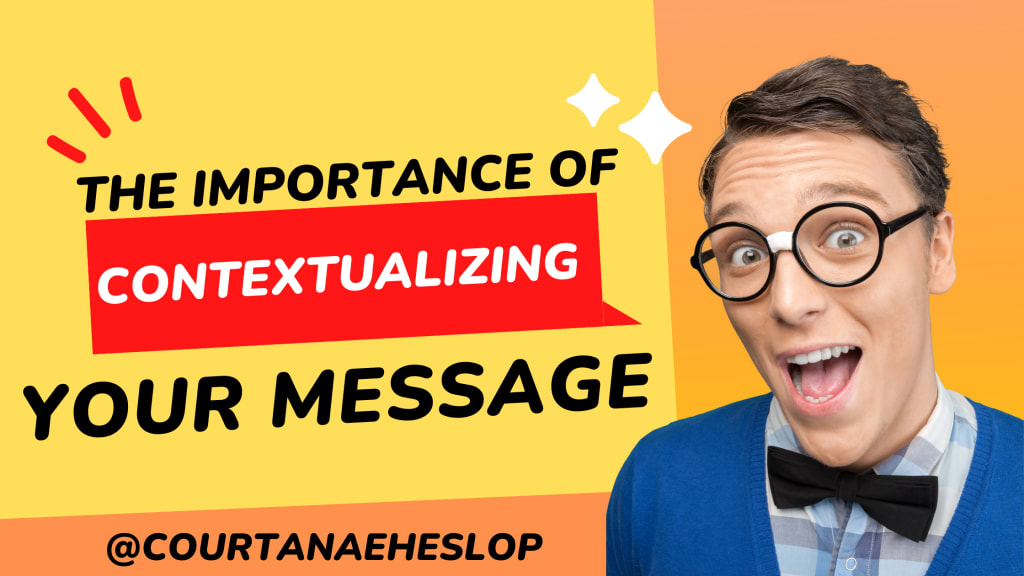The Importance of Contextualizing Your Message
You must also consider how your audience will interpret it in context, and how that understanding could change their perception of your message. The most important thing about context is that it helps people connect with each other and hear what each person has to say - and hopefully find common ground in doing so!

One of the most important aspects of any message is context. "Context" can mean a variety of things, but in this article we're going to focus on two primary concepts: the situational context and your personal context. The situational context includes the situation (who you're talking to, why they should listen) and environment (where you are, what's going on). Your personal context includes your history with this person or thing as well as how it relates to your beliefs and values. Both types of context are essential for making sure that people hear your message - and stay open minded while doing so!
Context and your message are inseparable.
What is context?

Context is the environment in which a message is delivered. The context of your message can be defined as the situation, circumstances, or background information surrounding an event or idea. It's the setting in which something happens or exists. For example, if you say "I bought a house," it sounds like one thing; but if you say "I bought a house where my father grew up," it sounds like something else entirely because now we know more about where this happened and why - and what may have led up to it (or not).
Context protects your message from being misconstrued.
Context is the key to understanding. When it comes to your message, context is everything. It helps you understand the situation, people involved, and environment.
If you're sending an email or creating a presentation for your boss explaining that he should fill out this form because it will help improve productivity at work, context will help him understand what exactly you mean by "improve productivity." You can't just say that without explaining why filling out forms will boost productivity or how filling out forms improves it overall in relation to other things like not doing any work at all or being stuck in traffic every day on their way into work
Context gives you a better understanding of the situation.
Context is the information that surrounds a message, and it can be really helpful in understanding the situation. For example, if someone says "I'm hungry" without providing context, it may seem like they want you to make them a sandwich or give them money for food. However, if they say "I'm hungry because I haven't eaten since breakfast," this changes how you interpret their request: now you know what they need and can help them out with something specific.
Contextualizing your messages will help your audience understand exactly what needs their attention (and how best to deliver it).
Context helps others be more open to hearing your message.
Context helps others be more open to hearing your message.
Context is a powerful tool for helping people see your message in a different light, and it can help them understand why it's important for you to say what you're saying.
I want to give some examples of how context can help people see your message as more important.
Context helps you stay focused, even when something goes wrong.
Context helps you stay focused, even when something goes wrong.
Contextualizing your message allows you to see the big picture and keep your focus on the end goal. This is especially useful when things go awry or you face setbacks along the way.
When a company decides to bring in new leadership, it can be easy for employees to lose sight of why they're there and what matters most for the future of their organization. But with a clear sense of context - what makes this business unique? What are its goals? - they'll have an easier time staying focused on what matters most: their mission, their vision and how they can realize them together with new leadership at the helm of the ship.
Your message will get heard better, and discussed with more mutual respect and understanding in context.
Your message will get heard better, and discussed with more mutual respect and understanding in context. Context helps you stay focused on the main point of your communication, which is that you want people to do a good job and be nice to each other. It also helps others understand the situation: they are expected to do this particular thing because it's important for the company's success, and they can trust that it'll be done right (not half-assed), so they don't have anything to worry about.
Contextualizing your message allows others who may not fully agree with your opinion or approach feel more comfortable sharing their own thoughts on the subject matter as part of an ongoing conversation - rather than shutting down debate altogether by saying something like "The decision was made! Move along!"
In short, context makes it easier for everyone involved in the discussion/project/etc..
Conclusion
To recap, it's not enough for you to deliver a message. You must also consider how your audience will interpret it in context, and how that understanding could change their perception of your message. The most important thing about context is that it helps people connect with each other and hear what each person has to say - and hopefully find common ground in doing so!
PS: Hi! I am a freelance writer with a passion for writing. I am open to most genres, but my primary expertise is in content and blog writing. If you would like to discuss any upcoming projects please feel free to contact me by email at [email protected]
About the Creator
Courtanae Heslop
Courtanae Heslop is a multi-genre writer and business owner.






Comments
There are no comments for this story
Be the first to respond and start the conversation.